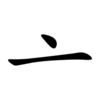亠
Jump to navigation
Jump to search
| ||||||||
| ||||||||
Translingual
[edit]| Stroke order | |||
|---|---|---|---|

| |||
Alternative forms
[edit]Although the character itself is written with a slanting 丶 dot in the Kangxi dictionary, most of its derived characters in the Ming typeface used in Japanese Kanji, Korean Hanja as well as the Kangxi dictionary uses a vertical dot for the upper component of 亠. This is slightly different from modern Chinese scripts, which use a slanting 丶 dot for the upper component of 亠 in its derived characters.
Han character
[edit]亠 (Kangxi radical 8, 亠+0, 2 strokes, cangjie input 難卜 (XY), four-corner 00000, composition ⿱丶一(GHTK) or ⿱丨一(J))
- Kangxi radical #8, ⼇.
Derived characters
[edit]- Appendix:Chinese radical/亠
- 六, 卞, 文, 市, 玄, 𢌮, 立, 𭀚, 充, 𣱵, 𣅀, 衣, 㐔, 𣫭, 弃, 𠑽, 𥃰, 言, 夜, 𢂋, 兖, 育, 帝, 兗, 竒, 𦚍, 𧴨, 𫟯, 𭐤, 𢍓, 高, 㖜, 旁, 畗, 商, 毫, 啇, 髙, 率, 𢛫, 䯧, 椉, 稁, 𣨻, 𧋲, 雍, 豪, 齊, 𢒲, 𮥿, 㙶, 䐡, 𩫏, 𬡭, 𠆛, 䥆, 韲, 𭺏, 𨏯, 𣅂, 𧍐
See also
[edit]- 哀, 衷, 衮, 衰, 衺, 𮕩, 袌, 袞, 袠, 袤, 袬, 𧙃, 袲, 裏, 裒, 裛, 䘱, 裵, 裹, 裦, 褎, 褏, 褒, 褢, 褭, 褱, 𧜏, 褻, 襃, 襄, 䙝, 簔
- 𮮻, 𬹱, 𮮺, 𮮼, 䐡, 韲, 𠆜, 𪗎, 𪗐
References
[edit]- Kangxi Dictionary: page 88, character 2
- Dai Kanwa Jiten: character 286
- Dae Jaweon: page 184, character 12
- Hanyu Da Zidian (first edition): volume 1, page 279, character 4
- Unihan data for U+4EA0
Chinese
[edit]| simp. and trad. |
亠 | |
|---|---|---|
Glyph origin
[edit]| Historical forms of the character 亠 |
|---|
| Shuowen Jiezi (compiled in Han) |
| Small seal script |

|
Pronunciation
[edit]- Mandarin
- (Standard Chinese)+
- Hanyu Pinyin:
- Zhuyin: ㄊㄡˊ
- Tongyong Pinyin: tóu
- Wade–Giles: tʻou2
- Yale: tóu
- Gwoyeu Romatzyh: tour
- Palladius: тоу (tou)
- Sinological IPA (key): /tʰoʊ̯³⁵/
- (Standard Chinese)+
- Cantonese
- (Standard Cantonese, Guangzhou–Hong Kong)
- Jyutping: tau4
- Yale: tàuh
- Cantonese Pinyin: tau4
- Guangdong Romanization: teo4
- Sinological IPA (key): /tʰɐu̯²¹/
- (Standard Cantonese, Guangzhou–Hong Kong)
- Southern Min
- (Hokkien: Quanzhou)
- Pe̍h-ōe-jī: thiô
- Tâi-lô: thiô
- Phofsit Daibuun: tiooi
- IPA (Quanzhou): /tʰio²⁴/
- (Hokkien: Quanzhou)
Definitions
[edit]亠
Japanese
[edit]Kanji
[edit]亠
- Meaning unclear.
- A radical (なべぶた, けいさんかんむり).
Readings
[edit]Korean
[edit]Hanja
[edit]亠 (eum 두 (du))
- This term needs a translation to English. Please help out and add a translation, then remove the text
{{rfdef}}.
Vietnamese
[edit]Han character
[edit]- This term needs a translation to English. Please help out and add a translation, then remove the text
{{rfdef}}.
References
[edit]Categories:
- CJK Unified Ideographs block
- Han script characters
- Kangxi Radicals block
- Han character radicals
- Translingual lemmas
- Translingual symbols
- Chinese lemmas
- Mandarin lemmas
- Cantonese lemmas
- Hokkien lemmas
- Chinese hanzi
- Mandarin hanzi
- Cantonese hanzi
- Hokkien hanzi
- Chinese terms with IPA pronunciation
- Chinese terms spelled with 亠
- Japanese kanji
- Japanese hyōgai kanji
- Japanese kanji with goon reading ず
- Japanese kanji with historical goon reading づ
- Japanese kanji with kan'on reading とう
- Japanese kanji with kun reading けいさん
- Japanese kanji with kun reading なべぶた
- Korean lemmas
- Korean hanja
- Vietnamese lemmas
- Vietnamese Han characters
- CJKV radicals
